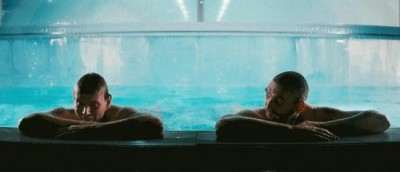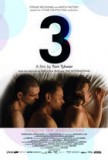| Reviews & Columns |
|
Reviews DVD TV on DVD Blu-ray 4K UHD International DVDs In Theaters Reviews by Studio Video Games Features Collector Series DVDs Easter Egg Database Interviews DVD Talk Radio Feature Articles Columns Anime Talk DVD Savant Horror DVDs The M.O.D. Squad Art House HD Talk Silent DVD
|
DVD Talk Forum |
|
|
| Resources |
|
DVD Price Search Customer Service #'s RCE Info Links |
|
Columns
|
|
|
3

Back in 1999, Movieline ran a piece called "100 Questions We Honestly Want to Ask Hollywood," and one line from it has always stuck with me: "How come Mike Figgis can do Leaving Las Vegas and then go back to being Mike Figgis?" It's memorable not only because it applies to Figgis (ever sat through The Loss of Sexual Innocence? Good heavens), but to a number of filmmakers who make one incredible film, one picture where everything snaps into place, and then never manage to replicate that, no matter how many times they try, and how many chances we give them.
All of this is a long way of getting around to saying that Tom Tykwer, the director of the electrifying Run Lola Run, has made yet another film that is nowhere near Run Lola Run. He has, it must (and should) be noted, gone to great pains in the years since that 1999 joyride to not churn out films that replicated that style (or, God help us, a sequel--Keep Running, Lola!). But the films he has made--The Princess and the Warrior, Heaven, Perfume, and The International--don't offer anything to replace the sheer ingeniousness and adrenaline of that breakthrough effort. None of them are bad films, but none of them are particularly memorable either. His latest, 3, is his least successful picture to date.
The story, as you could presumably guess from the title, concerns a love triangle. Simon (Sebastian Schipper) and Hanna (Sophie Rois) have been together for 20 years, but have never married; their relationship seems comfortable, if a little stormy (a clever opening credit sequence is a split-screen montage of fights and private moments of frustration, along with some quieter moments). She is a television host specializing in science, and she keeps running into Adam (Devid Striesow), a scientist with good timing and deep blue eyes. There is a spark, seen in scenes that are simple and direct. They are attracted to each other, and that attraction is eventually consummated.
This is the point at which Tykwer (who also wrote the script) begins to lose us, because the timing of that first liaison is a bit too convenient, thematically and certainly symbolically: Hanna is out banging the handsome scientist while Sebastian is having emergency surgery to remove one of his testicles. Yes, seriously. Even Freud would have said that was too on the nose (and even the most jaded TLC medical show producer would blanche at the unexpectedly, and frankly unnecessarily, graphic surgery inserts).
After that one-nighter, Hanna hurries to Simon's side and disappears from Adam's life. But then Adam meets Simon in a locker room, and hey, come to find out, he's bisexual, so he makes a pass at Simon. The fluidity of Adam's sexuality seems to function less as a characterization than as a script convenience; the odds that both Hanna and Simon would take up with the same guy (piled on to the notion that Simon would suddenly turn bi himself) are just too long. It's not what is believable--it's what the script deems necessary, so that Hanna can hover back towards Adam and we can get the film's central conceit, the love triangle. The stakes for that triangle are increased by the fact that a) neither Hanna nor Simon are aware of each other's participation in it, and b) they decide that this is the plum moment for them to get married. That, too, stretches credibility.
So, as an audience, we basically just spend the rest of the movie waiting for them to figure this thing out. Tykwer sets them up to crash into each other in a sequence that shows potential for tension and awkwardness, then cops out at the last minute; that fake-out is not only a cheap move, but it strangely takes the air out of the real confrontation, when it finally arrives.
There are elements of 3 worth recommending: the performers are all capable, it has something of a good time with its editing, and it has a fine sense of momentum (the score, by Tykwer and his longtime collaborators Reinhold Heil and Johnny Klimek, gives the picture a fast, driving pulse). And the film is admirably grown-up about its sexuality, particularly the (positive) psychological effect of these affairs on Simon and Hanna's own sex life.
But it is a tough film to endorse, primarily because there's not really anyone in it to sympathize with; they're all varying degrees of selfish and dishonest, none of which would be an issue if any of them were just a little bit more interesting. 3, like all of Tykwer's post-Lola output, confirms that he is a director of skill and professionalism. But he has yet to deliver on the promise of that film, which is getting further and further in the rearview.
Jason lives in New York. He holds an MA in Cultural Reporting and Criticism from NYU.
|
| Popular Reviews |
| Sponsored Links |
|
|
| Sponsored Links |
|
|
| Release List | Reviews | Shop | Newsletter | Forum | DVD Giveaways | Blu-Ray | Advertise |
|
Copyright 2024 DVDTalk.com All Rights Reserved. Legal Info, Privacy Policy, Terms of Use,
Manage Preferences,
Your Privacy Choices | |||||||











